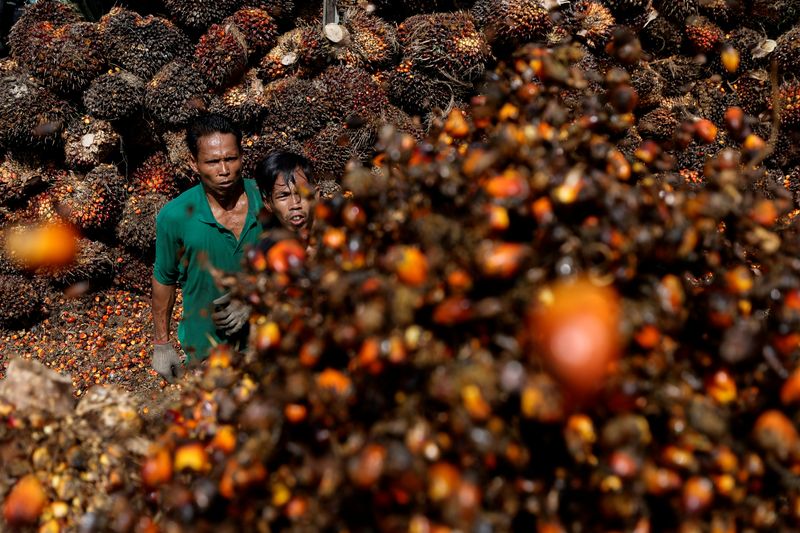By Bernadette Christina and Fransiska Nangoy
JAKARTA (Reuters) -Indonesia will lift its three-week-old palm oil export ban from Monday due to improvements in its domestic cooking oil supply, its president said, a move applauded by farmers amid mounting calls for its removal.
The world's top palm oil exporter on April 28 halted shipments of crude palm oil and some derivative products to try to tame soaring prices of domestic cooking oil, surprising markets that were already rattled by earlier government intervention measures.
President Joko Widodo on Thursday said the supply of bulk cooking oil had now reached a level greater than needed, although bulk prices had not yet receded to the targeted 14,000 rupiah per litre.
"In several regions I know prices of cooking oil were still relatively high, but I believe in coming weeks they will be more affordable," Jokowi, as the president is known, said in a video statement.
Industry groups had warned that the palm oil sector could grind to a halt in coming weeks if the export ban were to remain in place.
In taking the decision, the government was considering the welfare of 17 million workers, he said.
"Although exports are being reopened, the government will continue to closely supervise and monitor (the market) to ensure demand is being met with affordable prices," Jokowi added.
Palm oil's benchmark contract in Malaysia closed 0.98% lower and was expected to fall further following Indonesia's announcement. [POI/]
PRESSURE BUILDING
Members of parliament's budget committee had earlier urged Finance Minister Sri Mulyani Indrawati to ask the government to evaluate the export curbs.
The ban came while global vegetable oil markets were struggling from the squeeze in sunflower oil supply from the war in Ukraine.
Palm oil comprises a third of the world's vegetable oil market, with Indonesia accounting for about 60% of supply.
Despite imposing the ban to address domestic discontent over cooking oil, pressures have since mounted for it to be eased as Indonesian farmers saw demand shrink for their palm fruits.
Farmers earlier this week held a rally over the export ban as prices of palm fruits plummeted nationwide.
Responding to Jokowi's announcement, palm oil farmer union SPKS said they hoped plantation activities would "return to normal and farmers' economic condition will improve".
Indonesia has around 6 million tonnes of storage capacity, including at ports, and domestic stocks had reached around 5.8 million tonnes by early May, Sahat Sinaga, executive director of the Indonesia Vegetable Oil Industry Association, told Reuters.
Big plantation companies had started to lengthen the intervals of their harvest due to sales uncertainty for their products, while small farmers were waiting in line for days at palm oil mills trying to sell their fruits.

"The real conditions in the field have been very difficult because tanks were starting to fill up," said Eddy Martono, secretary general of the Indonesia Palm Oil Association.
"Hopefully, with the export reopening, palm oil production can resume."